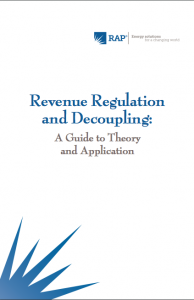Full Title: Revenue Regulation and Decoupling: A Guide to Theory and Application
Author(s): Regulatory Assistance Project
Publisher(s):
Publication Date: November 1, 2016
Full Text: Download Resource
Description (excerpt):
This document explains the fundamentals of revenue regulation, which is a means for setting a level of revenues that a regulated gas or electric utility will be allowed to collect, and its necessary adjunct decoupling, which is an adjustable price mechanism that breaks the link between the amount of energy sold and the actual (allowed) revenue collected by the utility. Put another way, decoupling is the means by which revenue regulation is effected. For this reason, the two terms are typically treated as synonyms in regulatory discourse; and, for simplicity’s sake, we treat them likewise here.
Revenue regulation does not change the way in which a utility’s allowed revenues (i.e., the “revenue requirement”) are calculated. A revenue requirement is based on a company’s underlying costs of service, and the means for calculating it relies on long-standing methods that need not be recapitulated in detail here. What is innovative about it, however, is how a defined revenue requirement is combined with decoupling to eliminate sales-related variability in revenues, thereby not only eliminating weather and general economic risks facing the company and its customers, but also removing potentially adverse financial consequences flowing from successful investment in end-use energy efficiency.
We begin by laying out the operational theory that underpins decoupling. We then explain the calculations used to apply a decoupling price adjustment. We close the document with several short sections describing some refinements to basic revenue regulation and decoupling.
